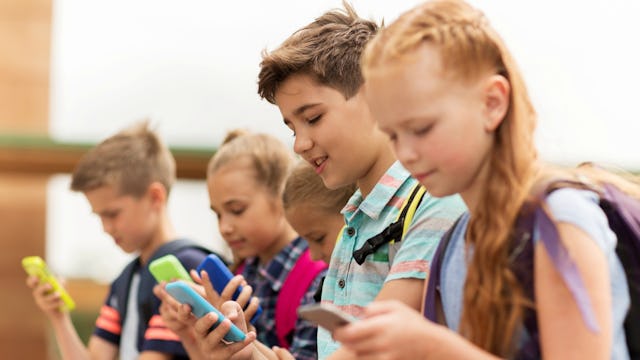Why You Should Think Twice Before Letting Your Tween Have Access To Social Media

Your tween wants a cell phone. You know what they are going to use it for: Facebook, Snapchat, Instagram, YouTube, all those social media apps you’re not quite sure about, but know kids are into these days. Isn’t there something called musical.ly?
Anyway, they say “all the other kids have one” and from what you can see of their friends, they might be right. You’re on the fence. It would be nice to be able to reach your kid readily. And the social media stuff — well, you can monitor that, right? It wouldn’t be that bad.
Except it could.
RELATED: The Modern Parent’s Guide To Internet Safety For Kids
A 38-year-old Venice, Florida man was arrested when police received a tip from some horrified parents that the 12-year-old boy their 11-year-old daughter had been Snapchatting might not exactly be 12 years old. Even worse, she’d been sending him explicit photos of herself to the man, who used “an erotic username.” When detectives performed a sting on the the home of Kelbi Burson, they scanned his electronic devices — and found nude photos of children. He was charged with, according to the Bradenton Herald, “transmitting harmful materials to a minor, five counts of possession of images related to sexual performance by a child and using a computer to solicit a child.”
But as scary as that is, according to Common Sense Media, worrying about sexual danger on the internet is like worrying about sexual abuse in real life: it’s not the stranger lurking around the corner, but the familiar friend you should be worried about.
The University of New Hampshire’s Youth Internet Safety Survey reported a 53% drop in unwanted sexual solicitations between 2000 and 2010. In 2010, only 9% of kids who used the internet had received a sexual solicitation. Requests for offline meetings and situations kids found extremely upsetting declined between 2005 and 2010. But most tellingly, they found that kids are more likely to pressure each other to send sexual content than adults. So it’s not Stranger Danger you need to worry about it. It’s the Boy Next Store asking for topless shots or the Girl Next Store passing on dick pics.
Not only is this disturbing — it’s also illegal. Most parents aren’t aware that when your tween gets pressured into sending nude pics of themselves, they’re actually guilty of disseminating child pornography. And more than half of adults 18-22 admitted to sexting as minors — 54%, according to Internet Safety 101 — with 28% saying those sexts involved pictures. Peer pressure and popularity, Internet Safety says, are two key reasons teens sext.
And we all know tweens cave to peer pressure and crave popularity.
There’s good reason for that. In the tween years, kids go from what The Child Mind Institute calls “the more literal and self-absorbed perspective they’ve been using to view the world for the first 8 years of their lives” to a more metacognitive state where they’re more aware of the thoughts and ideas of others — including, most tellingly, what others think about them. They care about what other people think. They want to fit in. They’re scared of being left out. All this leads, along with a decrease in prefrontal cortex function, to the impulse to make bad decisions that lack understanding of future consequences, says the The Blink of Your Eye, a site about teen and tween development.
Basically, your kid can’t see beyond the immediate peer pressure and instant gratification of sending their boyfriend a topless pic. Or sending that very nice, very kind internet stranger some sexy selfies. Or “posing sexy” on Instagram to gain more likes, a tangible metric of popularity — which, according to The National Post , is happening as early as sixth grade.
Social media platforms have a minimum age of 13 for a reason.
This doesn’t touch on BBC reports that 53% of 11-16 year olds have seen “explicit material” online, “94% by the age of 14.” 28% of 11-12 year olds have seen pornography, more as pop-up ads than explicit searches. But that didn’t stop more than half of boys and about 40% of girls thinking it showed “realistic depictions of sex.” Talk about warping your kid’s perspective of sexuality in a drastic and permanent fashion.
So maybe tweens aren’t ready for those cell phones. And if they do get those phones, they aren’t ready for social media accounts. And if they do get those social media accounts, you had better lock those things down: know the apps they use, know their passwords, monitor their chats, monitor their private messages — basically be their personal internet stalker.
Because if you aren’t, someone else might be.
Checking their phone each night or holding out on letting them get social media accounts altogether might seem like a pain, but it’s a hell of a lot better than the alternatives of sexploitation, sextortion, or worse.
This article was originally published on